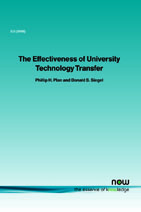The Effectiveness of University Technology Transfer
By Phillip H. Phan, Lally School of Management and Technology, Rensselaer Polytechnic Institute, USA | Donald S. Siegel, A. Gary Anderson Graduate School of Management, University of California at Riverside, USA, Donald.Siegel@ucr.edu
Abstract
In recent years, there have been numerous studies of the effectiveness of university technology transfer. Such technology transfer mechanisms include licensing agreements between the university and private firms, science parks, incubators, and university-based startups. We review and synthesize these papers and present some pointed recommendations on how to enhance effectiveness. Implementation of these recommendations will depend on the mechanisms that universities choose to stress, based on their technology transfer "strategy." For example, institutions that emphasize the entrepreneurial dimension of technology transfer must address skill deficiencies in technology transfer offices, reward systems that are inconsistent with enhanced entrepreneurial activity and the lack of training for faculty members, post-docs, and graduate students in starting new ventures or interacting with entrepreneurs. Universities will also have to confront a set of issues related to ethics and social responsibility, as they more aggressively pursue technology commercialization. Finally, we suggest some possible theoretical frameworks for additional research.
The Effectiveness of University Technology Transfer
In recent years, there have been numerous studies of the effectiveness of university technology transfer. Such technology transfer mechanisms include licensing agreements between the university and private firms, science parks, incubators, and university-based startups. The Effectiveness of University Technology Transfer reviews this literature and presents recommendations on how to enhance effectiveness. Implementation of these recommendations will depend on the mechanisms that universities choose to stress, based on their technology transfer "strategy." Institutions that emphasize the entrepreneurial dimension of technology transfer must address skill deficiencies in technology transfer offices, reward systems that are inconsistent with enhanced entrepreneurial activity and the lack of training for faculty members, post-docs, and graduate students in starting new ventures or interacting with entrepreneurs. Universities also have to confront a set of issues related to ethics and social responsibility as they more aggressively pursue technology commercialization. Finally, the authors suggest some theoretical frameworks for additional research.
